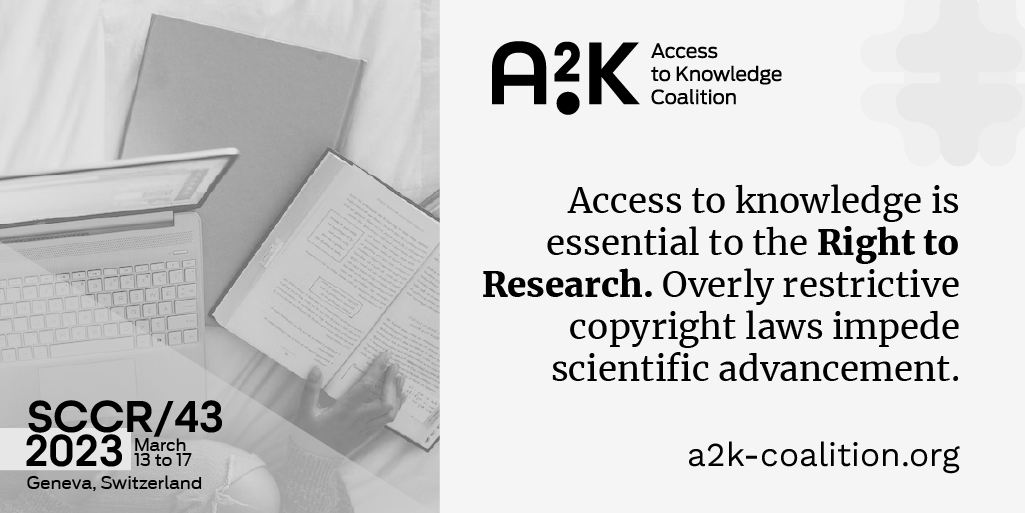Exceptions and Limitations on the WIPO Agenda
The third day of the 43rd session of the WIPO Standing Committee on Copyright and Related Rights is intended for discussion on the topic of exceptions and limitations to copyright, especially in connection with the right to research.
At the last year’s session of the Standing Committee, the African Group already proposed a work program on exceptions and limitations (Proposal by the African Group for a Draft Work Program on Exceptions and Limitations), with the aim of creating more fair and balanced copyright system that supports creativity and promotes the public interest, including promoting digital access to education and research and to cultural heritage.
According to the Access to Knowledge Coalition (hereinafter A2K coalition), which IPI is also a member of, the African Group program establishes a solid framework for the development of the work related to exceptions and limitations already made in the past by the Standing Committee and also for further discussion regarding exceptions and limitations for libraries, archives, educational and research institutions and for enabling access for persons with disabilities. According to the A2K coalition, it could be beneficial for the Standing Committee to set timelines for managing the tasks set out in the program, similar to those that guided the implementation of the 2019 Action Plans on Limitations and Exceptions Through SCCR/39 (2nd meeting in 2019).
At today’s session, Dr. Maja Bogataj Jančič made the following statement on behalf of IPI:
“I speak in the name of Intellectual Property Institute, observer at WIPO and member of A2K coalition.
The focus of my intervention is research – the driving force of social progress.
The possibility of independent research is a fundamental human right.
It is also the foundation of the sovereignty of states, especially today when big data and data analytic play such an important role in research and innovation.
Humanity is facing enormous challenges: e.g. climate change, global health challenges.
The cooperation of individuals across national borders, and especially the cooperation of researchers and scientists, is key to solving these gigantic challenges.
The establishment of a legal regime that will adequately encourage not only creators and investors in creative processes, but also researchers and scientists is therefore crucial.
Researchers and scientists among others are responsible that new technologies and new methods for research are available for the common progress of society.
It is crucial for international legislators, this is you, dear delegates, to establish appropriate legislative frameworks, that copyright regime will not represent obstacles and unnecessary walls on the way to solving the biggest global challenges.
Harmonized exceptions and limitations for research are the key.
Exceptions and limitations are not tools to take sth. away, but a way forward to design a balanced system that will work for common good.
The African proposal shows the right way forward.”
COMMUNIA and its partners, including IPI, discussed the challenges in the field of international research with researchers and published the findings in the publication “Nobody puts research in a cage“.
On Thursday, July 4, 2024, TV SLO 1 aired a new show Conversations about the Future with the subtitle Alternative Futures, in which three guests reflected on the dilemmas and opportunities of an increasingly digitized society. In addition to Dr. Maja Bogataj Jančič from ODIPI, were also anthropologists Dr. Dan Podjed from ZRC SAZU and computer engineer Dr. Blaž Zupan from the Faculty of Computer Science and Informatics UL.
In the first week of July 2024, the Summer Course on International Copyright Law and Policy took place in Amsterdam, which was also attended by the young researcher Laura Pipan from ODIPI.
On Friday, June 14, 2024, the second day of the Global Conference on AI and Human Rights took place at the Faculty of Law of the University of Ljubljana. Dr. Maja Bogataj Jančič gave a lecture as part of the 14th panel entitled AI and Intellectual Property: Revolution or Robbery?
Non-profit organisation Electronic Information for Libraries (EIFL) launched a new guide on rights retention and secondary publishing rights to raise awareness, support researchers and authors in EIFL partner countries and improve the achievement of open access to research.





